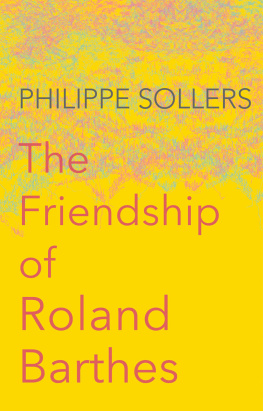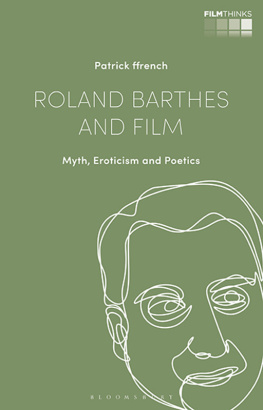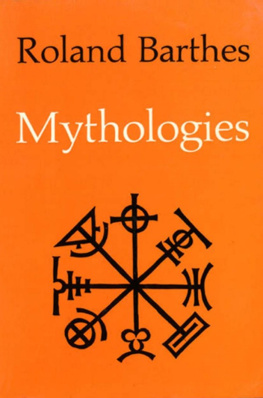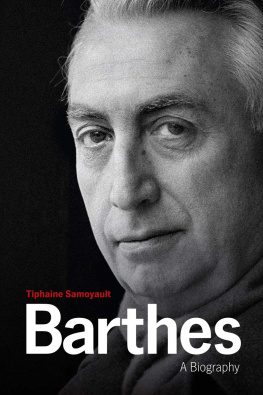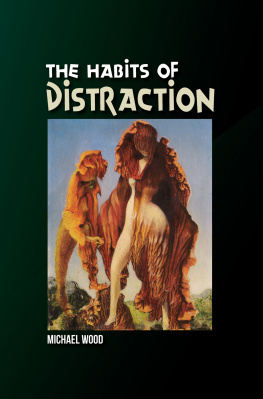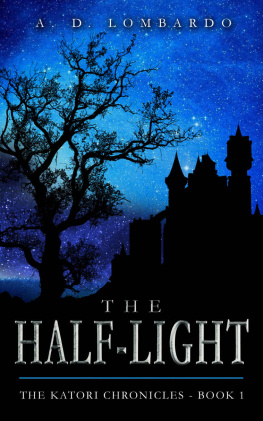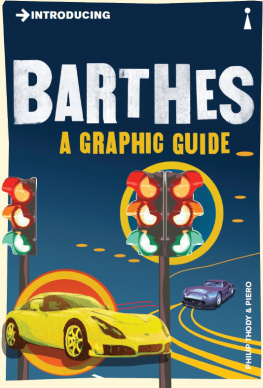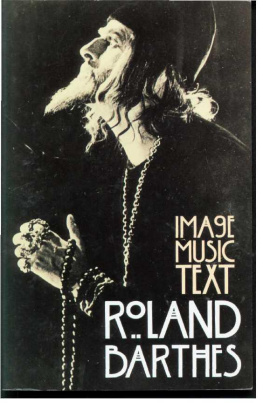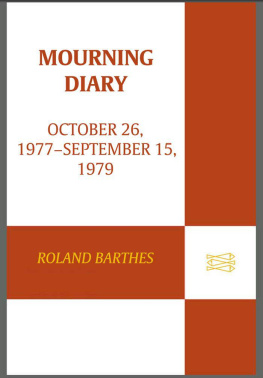Lombardo Patrizia - The three paradoxes of Roland Barthes
Here you can read online Lombardo Patrizia - The three paradoxes of Roland Barthes full text of the book (entire story) in english for free. Download pdf and epub, get meaning, cover and reviews about this ebook. City: Athens;Ga, year: 1989, publisher: University of Georgia Press, genre: Art. Description of the work, (preface) as well as reviews are available. Best literature library LitArk.com created for fans of good reading and offers a wide selection of genres:
Romance novel
Science fiction
Adventure
Detective
Science
History
Home and family
Prose
Art
Politics
Computer
Non-fiction
Religion
Business
Children
Humor
Choose a favorite category and find really read worthwhile books. Enjoy immersion in the world of imagination, feel the emotions of the characters or learn something new for yourself, make an fascinating discovery.

- Book:The three paradoxes of Roland Barthes
- Author:
- Publisher:University of Georgia Press
- Genre:
- Year:1989
- City:Athens;Ga
- Rating:4 / 5
- Favourites:Add to favourites
- Your mark:
- 80
- 1
- 2
- 3
- 4
- 5
The three paradoxes of Roland Barthes: summary, description and annotation
We offer to read an annotation, description, summary or preface (depends on what the author of the book "The three paradoxes of Roland Barthes" wrote himself). If you haven't found the necessary information about the book — write in the comments, we will try to find it.
The three paradoxes of Roland Barthes — read online for free the complete book (whole text) full work
Below is the text of the book, divided by pages. System saving the place of the last page read, allows you to conveniently read the book "The three paradoxes of Roland Barthes" online for free, without having to search again every time where you left off. Put a bookmark, and you can go to the page where you finished reading at any time.
Font size:
Interval:
Bookmark:
The Three Paradoxes of Roland Barthes
Patrizia Lombardo

Paperback edition, 2010
1989 by the University of Georgia Press
Athens, Georgia 30602
www.ugapress.org
All rights reserved
Designed by Mary Mendell
Set in Pilgrim
Printed digitally in the United States of America
The Library of Congress has cataloged the hardcover edition of this book as follows:
Library of Congress Cataloging-in-Publication Data
Lombardo, Patrizia.
The three paradoxes of Roland Barthes / Patrizia Lombardo.
xiv, 165 p. ; 23 cm.
ISBN 0-8203-1139-1 (alk. paper)
Includes index.
Bibliography: p. [157]-162.
1. Barthes, Roland. I. Title.
P85.B33 L66 1989
808.00141 19 88-39328
Paperback ISBN-13: 978-0-8203-3493-6
ISBN-10: 0-8203-3493-6
ISBN for digital edition: 978-0-8203-4659-5
British Library Cataloging-in-Publication Data available
Photogtaph of Roland Barthes by Arthur W. Wang
One cannot undertake the study of any author without asking oneself what, after all, is criticisma question that becomes all the more urgent when the author studied is a critic. One would like a firm, trustworthy answer to use as a point of departure, if not also as a point of arrival. There is, of course, no definitive answer because literary criticism is centered on that very question, which has as its double another question that directs and orients it: what is literature? But literature simply isand has been, and will be.
It was through this process of questioning without finding an answer that I decided to begin my study with Writing Degree Zero, in which Barthes, at the beginning of his critical enterprise, sought to define literature and formulated his notion of writing.
When I write, problems become gradually very concrete. At some point, after the initial decision of a subject or a theme, I realize that the pages are multiplying and the argument is proceeding by a weaving together of ideas and fragments: the luminous citations of a text or an author, sentences that strike me by their music or because they make up essential links in a chain of argumentation. I am not sure what comes first, the idea of a critical interpretation or these flashes. It really matters little: this is the only time when I believe that it is possible for reading and writing to coincide and that such a coincidence can exist alongside the deep divergence between reading and writing, before the decision to write actually takes place, before the vouloir-crire comes into being.
Roland Barthes: my debt toward him lies in this will-to-write. I owe him neither a method nor a set of conceptsI could have found both elsewherebut an attitude, a moral sense. Not knowledge, but will. In Inaugural Lecture, Barthes said: Sapientia: no power, a little knowledge, a little wisdom, and as much flavor as possible.
Roland Barthes: my maestro. I like using that outmoded name. I can see him stillin the seminar, rue de Tournon in Paris, where a few years ago, on the occasion of an exhibit on the Viennese architect Adolf Loos, I visited again the place, now changed into a gallery, where we used to meet in a small group. The ecstasy of the seminar, which Barthes himself had commented on so many timesthe religion of friendship, the religion of literature.
I remember Roland Barthes in New York, in October or November 1978, at New York University, in an immense and overcrowded auditorium. He spoke of Proust and his own intention to write a novel of pathos. It was an unexpected lecture, altogether unwonted, the way prophecies today are unexpected and unwontedor even personal declarations, when they are devoid of sentimentality, for we have become so accustomed to professionalism and coded languages.
That room and his voice: combined images of his success and his solitude, his slightly bashful being. I did not listen to what might be called a good lecture, a good academic performance, but I experienced the space, time, and accent of true words.
It was not my intention to write an homage to Barthes. Nor was it my intention to write a comprehensive study on Barthes and structuralism, or any other intellectual movement (there are already several studies of this type, and two of them are remarkable: by Annette Lavers and Steven Ungar). I wanted to focus on what I consider the most original quality of Barthes within our contemporary literature and criticism, which is simply his concern for literature and its destiny in a world where there is very little place for it. This is the reason why I do not follow the chronology, or deal with all his books. I insist on some and neglect others, even if they are the most famous ones that launched a new approach in literary studies (like On Racine and S/Z). I am not primarily interested in Barthess structuralism or semiotics, in the avant-garde pretensions of the new. I would say that I am more interested in the failure of structuralism, in Barthess invalidation of the scientific dream of the 1960s and 1970s. I think that it is worthwhile today to stress the genealogy of literary thought that obviously links Barthes to several nineteenth-century French writers and Proust, and almost unexpectedly to writers like Hugo von Hofmannsthal, who, at the turn of the century, gave voice to a deep historical crisis and his personal melancholy in a world lapsing away. I see Barthes as part of this crucial ambiguity that determined the modern writer, or the writer of modernity, since Baudelaire and Flaubert. This ambiguity consists in an irresistible attraction for something new, different, breaking with the past, and at the same time an unavoidable scorn for the contemporary world, all the empty talk that gives us the illusion that we belong to something.
I want to trace the pattern of that ambiguity, which is formal as well as political. Barthes oscillated between a revolutionary position and a reactionary one, between the rhetoric
The first paradox, which I discuss in of representation, which haunted Barthes as much as our entire generation. The interest in photography is a further step in the analysis of this same problem.
I define Barthess second paradox with a blunt statement, which is the title of : Against Language. These words theatrically challenge the most widespread stereotype of the structuralist and post-structuralist age, namely, that everything is language. My effort in this chapter is to weave together the different and often contradictory positions Barthes adopted regarding language. In this respect, one should insist on his 1978 inaugural lecture at the Collge de France, and what I would call the critical tragedy, the burning paradox it represented: in the very moment Barthes was giving status to the new discipline of semiology, he publicly rejected its scientific pretensions, proclaimed the fascism of language, and expressed his nostalgic love for literature, in terms close to Prousts aesthetics.
In , the discussion of Barthess hesitations as regards realism brings us back again to the rapport between him and Proust, so obvious in Camera Lucida. However, I think that Barthess author, his great passion, the one he identified with, was less Proust than Michelet, who, standing alone and resolute against his own century, spoke of love. With Michelet the tension between history and literature, which opened my investigation, comes back as a conclusion. In spite of the expectations Barthes himself created with all his talk about his desire to write a novel, I consider
Next pageFont size:
Interval:
Bookmark:
Similar books «The three paradoxes of Roland Barthes»
Look at similar books to The three paradoxes of Roland Barthes. We have selected literature similar in name and meaning in the hope of providing readers with more options to find new, interesting, not yet read works.
Discussion, reviews of the book The three paradoxes of Roland Barthes and just readers' own opinions. Leave your comments, write what you think about the work, its meaning or the main characters. Specify what exactly you liked and what you didn't like, and why you think so.

